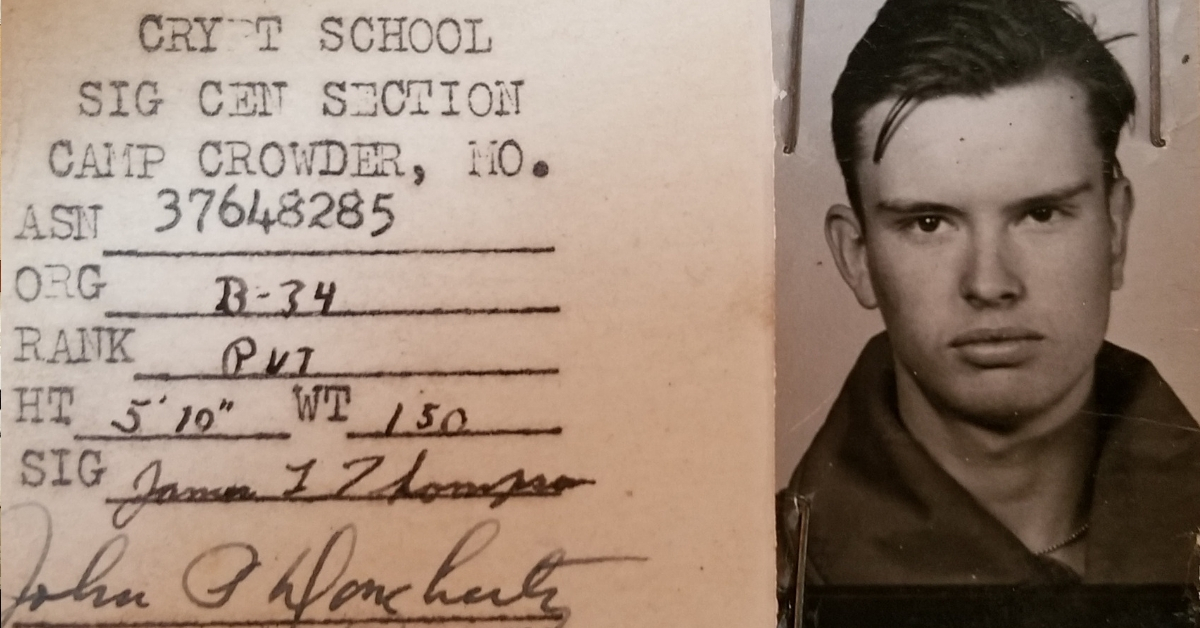Growing up with dyslexia, James Thompson faced many challenges in his early learning experiences, which tempered his ambitions toward pursuing an education in future years.
Additionally, while in the eleventh grade in the fall of 1944, he received his draft notice and believed it to be the end of any formal education; instead, the military later provided the spirit and resources to earn a master’s degree.
“I was 18 years old when I received my draft notice for the U.S. Army and left Columbia by bus on October 20 (1944),” said the veteran. “When we arrived at Jefferson Barracks (St. Louis), we were given another physical, issued our uniforms and the next morning put on a train to Camp Crowder.”
For the next few weeks, he underwent his basic training followed by lineman training, instruction as a radio operator and cryptographic training.
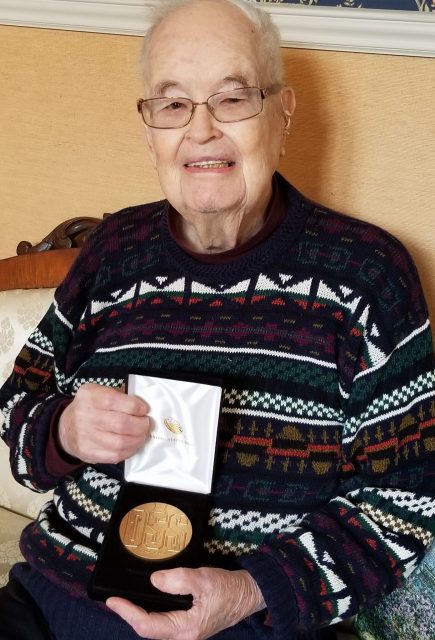
“The first sergeant came and got me and said there’s a guy (in civilian clothes) who wants to interview you,” Thompson said. “After that, I was in the Office of Strategic Services (OSS)—the forerunner to the Central Intelligence Agency (CIA),” he added.
Serving as “the first organized effort by the United States to implement a centralized system of strategic intelligence and the predecessor (to the CIA),” the OSS was established on June 13, 1942 and conducted many covert functions such as receiving and decoding enemy communications, noted the website of the OSS Society.
In the summer of 1945, Thompson received orders for overseas service but was first given several days leave back home. He then took a train to California and, from there, sailed aboard a troop ship to the island of Eniwetok. His journey ended with his arrival at Clark Air Base in the Philippines, where he spent the next several months as a cryptographer.
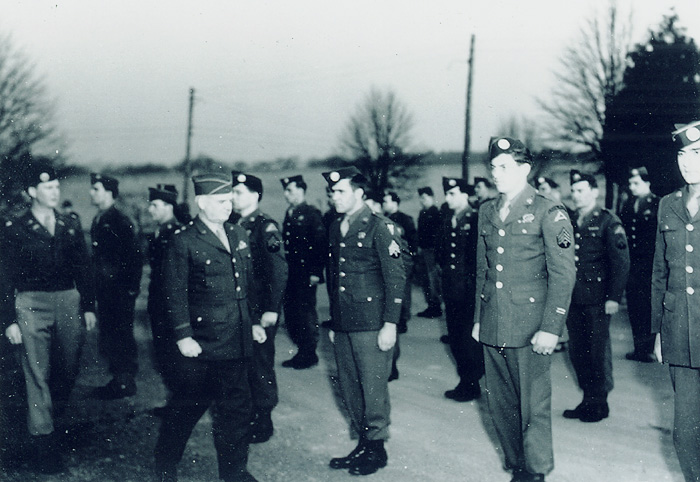
“The OSS was disbanded because the war was over,” said Thompson. “I can remember that in late November 1945, there were about six of us transferred from the Philippines to Tokyo, Japan, at the headquarters of General Douglas MacArthur who was there as oversight for the occupational forces.”
The veteran explained that he was part of a group who processed messages sent to and from Sixth Army and MacArthur’s headquarters. While there, he was later promoted to sergeant and placed in charge of the code room, which had the responsibility of decoding message traffic.
While in Japan, his enlistment expired but he chose to remain there as a civilian to continue the work he enjoyed at McArthur’s headquarters. However, in June 1947, he returned to the United States and was able to enroll in college at the University of Missouri despite having not completed his high school education a few years earlier.
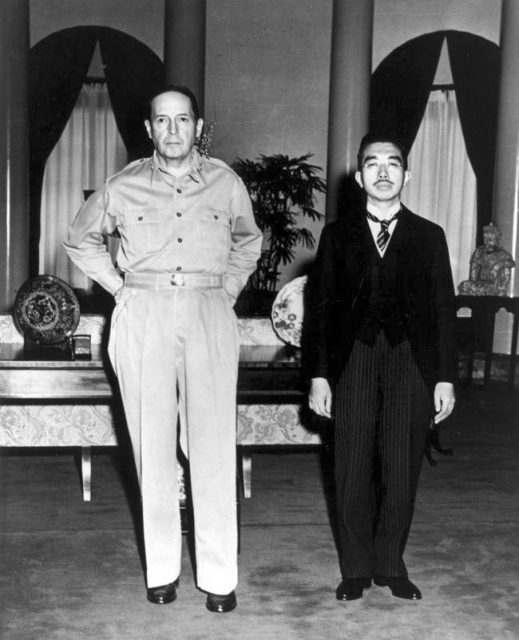
“In 1951, I earned my bachelor’s degree in psychology,” recalled Thompson. “While I was at MU, I was informed that since I had held the rank of sergeant in the Army, I could complete one semester of ROTC and qualify for commission as a second lieutenant in the Air Force upon graduation.”
The former soldier began his Air Force career as an officer when assigned to Bangor, Maine, administering entrance exams for new recruits and draftees. It was here that he met the former Barbara Longfellow while taking courses at the University of Maine and the two soon married. The couple went on to raise three sons.
From there, he was briefly transferred to Tinker Air Force Base in Oklahoma, before receiving assignment to Wheelus Air Base in Tripoli, Libya, spending time as an administrative officer for the 580th Air Materiel Assembly Squadron.
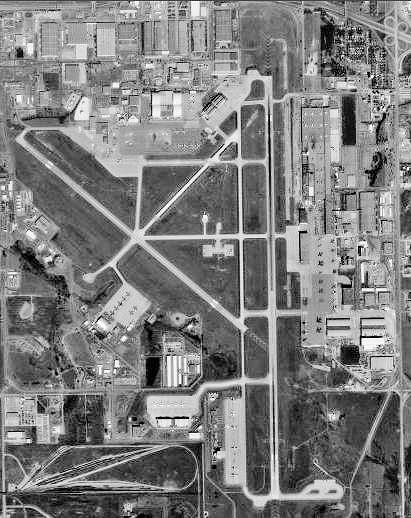
“I became the adjutant for the base administrative officer at Selfridge Field (Michigan) in 1959,” he explained. “I made captain while I was there and then became the administrative officer and later commander for the 753rd Radar Station at Sault St. Maria, Michigan.”
He would later attend the first class of the Defense Intelligence Agency in Washington D.C., as the various military service branches learned to combine their intelligence gathering capabilities.
From 1962 to 1966, he was stationed in Ramstein, Germany, gathering intelligence on the Soviet air capabilities.
In Germany, he took courses through the University of Southern California, earning his master’s degree in systems management. He was then transferred to Little Rock, Arkansas, for a year followed by his assignment to Vietnam. During the war, he was stationed in Nha Trang and briefed pilots prior to their aerial missions.
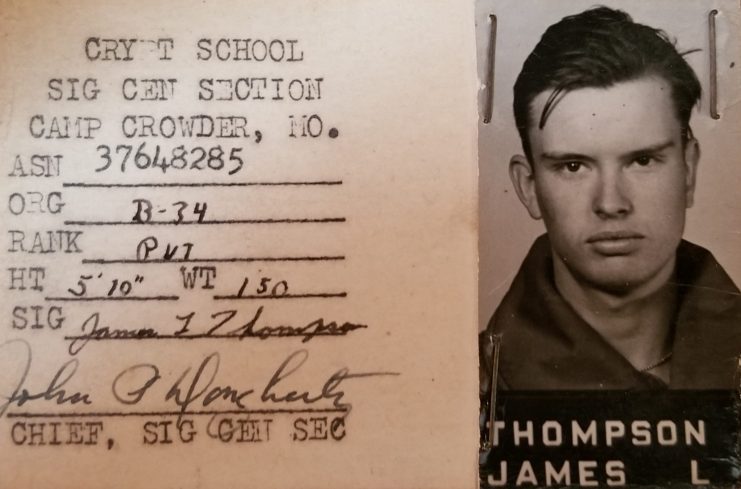
“I was given my base of choice when returning to the states in 1969, so I chose Whiteman Air Force Base,” said Thompson. “I spent the last few months of my career there and retired as a major with 20 years, 1 month and 1 day of service,” he grinned.
His military career, he explained, was a collection of unique experiences that did not follow a linear path. As a child, he further noted, he would never have imagined the opportunity for an advanced education or the option of pursuing his interest of becoming a member of the military.
“When I was younger, the military was something I always wanted to do and I never believed I could join the Army or Air Force because of my dyslexia,” he said. “My ambitions weren’t all that high as a child but then I was drafted, I encountered people who I admired and inspired me to achieve.”
He concluded, “When it was all said and done, I not only got to serve both in the Army and Air Force, but this young man,” he said, pointing to himself, “who didn’t finished high school, was able to earn a master’s degree … all because of the military.”
Jeremy P. Ämick writes on behalf of the Silver Star Families of America.
Another Article From Us: Third Reich’s Abandoned “Highway” For Stolen Gold
